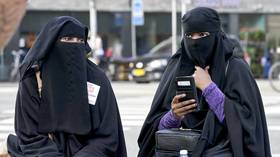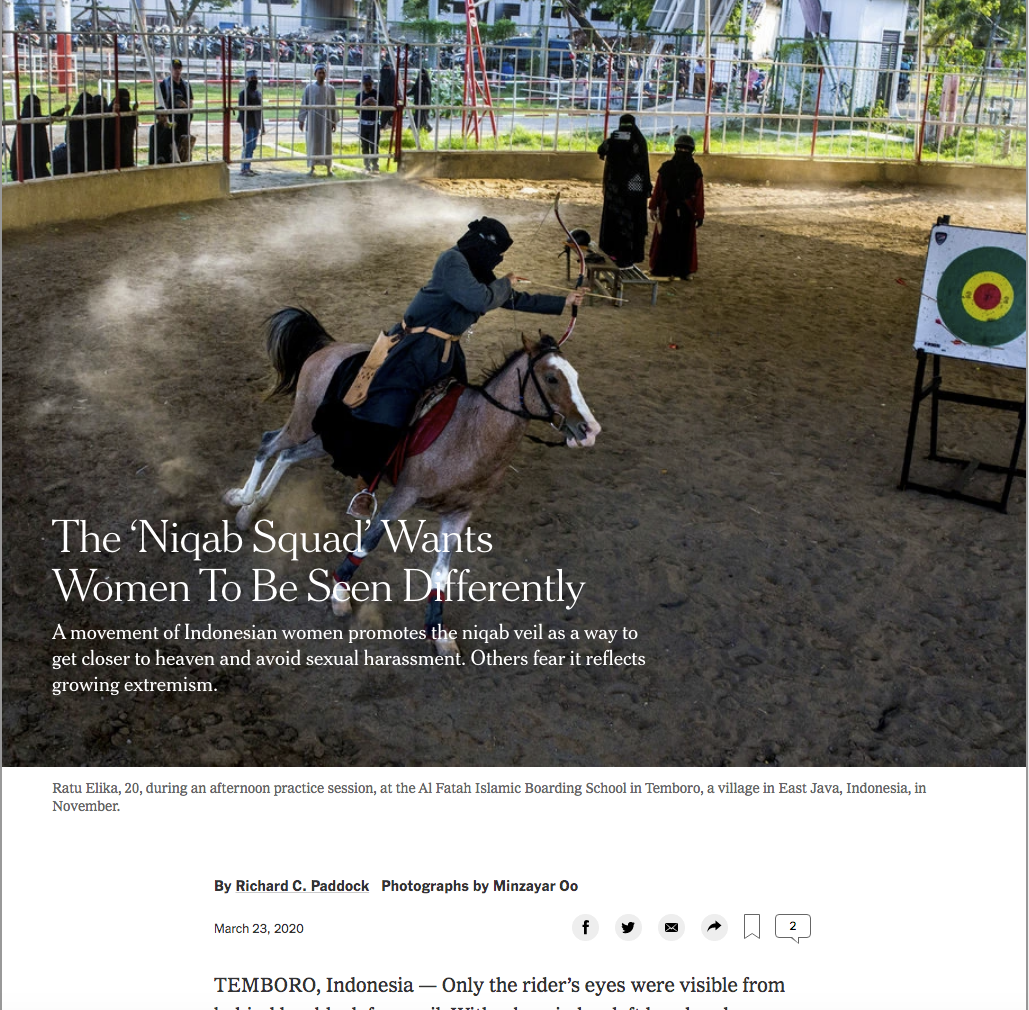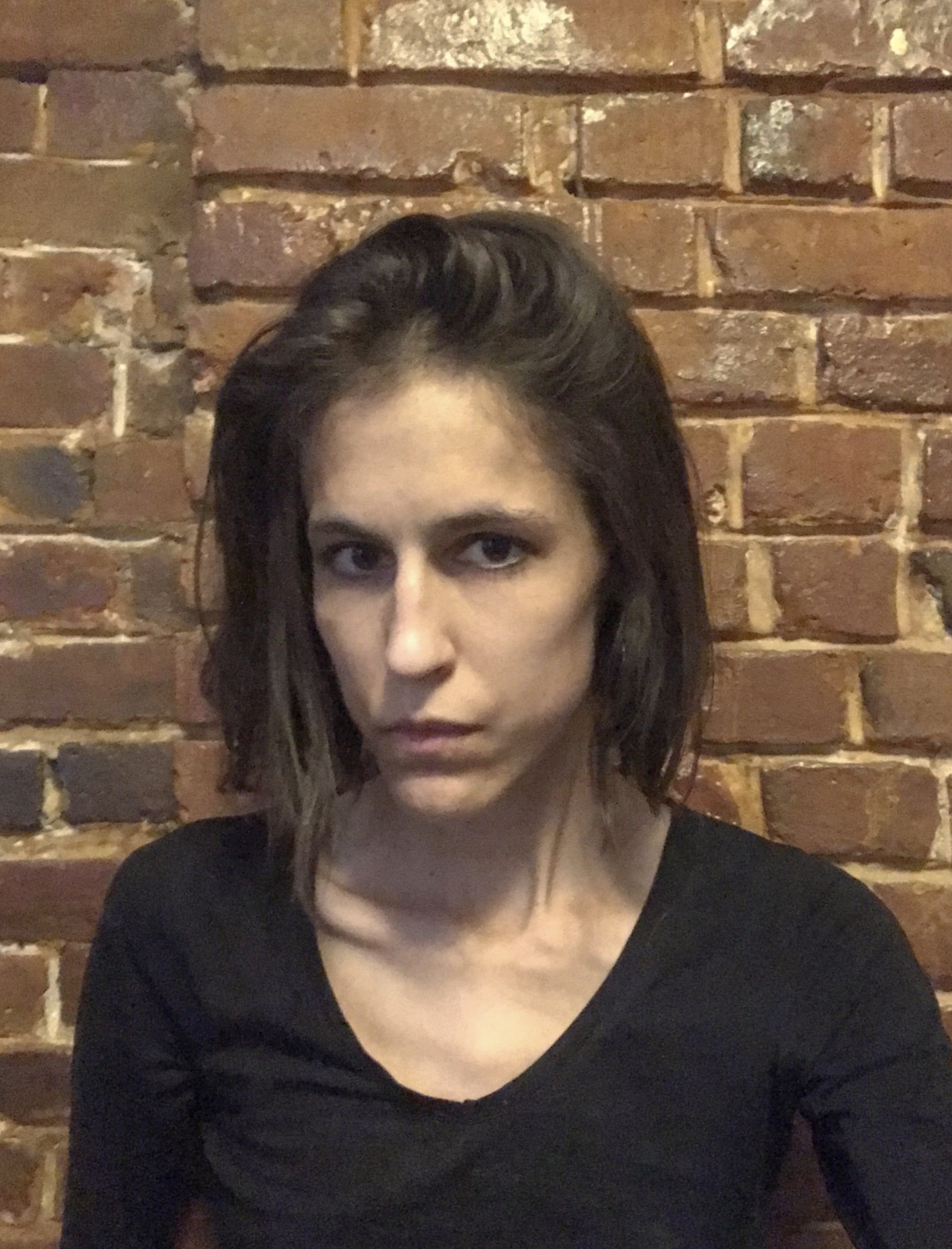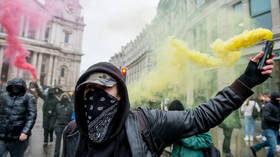New York Times promotes face-veiling Indonesian Muslim 'Niqab Squad’ as totally-not-extremist answer to Western feminism

The New York Times is singing the praises of Indonesia’s born-again Muslim sects, profiling a group who mix Islamic doctrine with girl-power platitudes beneath their niqabs and hailing the garments as the answer to harassment.
The woker-than-thou outlet wants readers to know that these Indonesian ladies, who – unlike the vast majority of their countrywomen – sport the full-face veil known as the niqab, are anything but oppressed. They’re photographed hitting bullseyes with bow and arrow from horseback, a feat made all the more impressive by the billowing folds of fabric that envelop their bodies, hiding all but their eyes.

The women profiled in the piece, many of whom are members of various traditionalist ‘born again’ Islamic sects, are depicted as eager to distance themselves from the extremism the veil tends to connote, even in majority-Muslim Indonesia, and the misogyny considered part and parcel of hardline Islamic regimes. But Indonesia is a secular country, and the Times sings the praises of the “thousands of mainly urban, middle-class women” who “have made [the choice to wear the niqab] for themselves,” renouncing modern dress and “practicing sports that the Prophet Muhammad is thought to have enjoyed” at events around the country.
The Times is hardly able to rein in its enthusiasm for the “Niqab Squad,” the picture-perfect group of arrow-shooting, horseback-riding women founded by a clothing designer in 2016 “to promote wearing the veil.” They aren't the first Western outlet eager to celebrate any morsel of progressivism in Islam that has been seduced by the photogenic females, and they describe the “peaceful, born-again” traditional Hijrah movement many of the Squad members follow in glowing terms. Nor is the Times subtle in its praise of similar (but unaffiliated) “Islamic purist” movement Tablighi Jama’at, which is banned in Russia as an extremist group and has been described as a “gateway to terrorism” by other countries’ analysts in the past. The movement’s leaders insist it is apolitical, focused merely on returning to a traditional Islamic lifestyle, though some critics have suggested this (lack of) stance is merely to avoid setting off alarm bells within host countries.
Also on rt.com Netanyahu's spokesman under fire for calling niqab-clad Gaza protesters 'ISIS women'And if those who enjoy horseback-riding in traditional dress like to talk about how living the seventh-century lifestyle (the usually militantly-pro-vaccine Times doesn’t seem to mind that one community “disdains” the shots) “improves [their] chances of going to heaven”? Well, don’t knock it ’till you’ve tried it, reporter Richard Paddock implies with his enthusiastic profile.
But not every niqab-clad woman gets to make that choice. While the piece glowingly describes the traditionalist town of Temboro, “Indonesia’s Medina,” as a religious haven that “shuts down five times a day at prayer time,” it only mentions in passing that girls who attend the eight-campus Al Fatah school that dominates the town have no choice but to wear the veil starting at age 5. Those who aspire to more than studying the Koran (and teaching others to study the Koran) would seem to have little to look forward to within its walls, even as the lifestyle is (according to the Times, at least) attracting worldly-wise “urban, middle class” women in droves with the help of social media proselytizing.
And while the Times clearly wants the reader to see empowered, independent feminists in these women clad in head-to-toe black fabric, the Temboro residents’ own view toward sexual harassment echoes the “traditional” outlook, indicating that even the born-again Muslim women drawn to the town leave their modern sexual mores behind. One 25-year-old woman said she feared even showing her hands or eyes in public was risking “unwanted male attention,” and the outlet itself acknowledges that “unwanted sexual advances” are common.
Also on rt.com PC healthcare? UK doctor may lose job for asking Muslim woman to remove face veilThe pious rhetoric of the Niqab Squad suggests these women are plunging into conservative Islam for more than fashion statements and equestrianism – “we really want to go to heaven, and so we sacrifice,” founder Indadari Mindrayanti said, explaining that “part of our sacrifice is not showing our beauty and covering our body in an Islamic way” – and there’s certainly nothing wrong with having a healthy respect for tradition. But depicting these fundamentalist Islamic communities as a haven for empowered women – to a Western audience, no less – is irresponsible at best, and wildly disingenuous at worst.
Like this story? Share it with a friend!
The statements, views and opinions expressed in this column are solely those of the author and do not necessarily represent those of RT.















